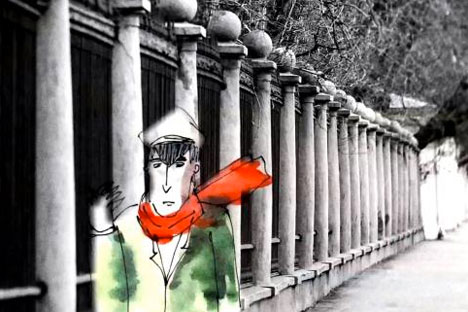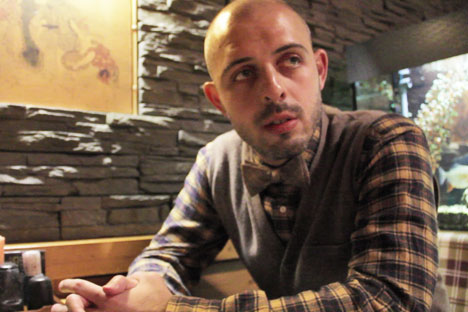
“The Twelve Chairs” centers on the merry antics of Ostap Bender and Kisa Vorobyaninov—two good-for-nothing con artists who go on the hunt for diamonds sewn by one Madame Petukhova into the upholstery of some chairs that are sold off at auction. Source: pioner-cinema.ru
“Ilfipetrov” is the fifth film in Roman Liberov’s “Writers” series. This time, his work is dedicated to the Soviet writers and co-authors Ilya Ilf and Yevgeny Petrov—the creators of the highly popular novels “The Twelve Chairs” and “The Golden Calf.” Liberov is also credited with the films “Yuri Olesha: Nickname the ‘Writer,’” “A Conversation with a Heavenly Being” (about Joseph Brodsky), “A Day of Zhora Vladimov,” and “Written by Sergei Dovlatov.”
On the one hand, “Ilfipetrov” is a documentary. As Liberov stresses, the film is 100-percent based on documents: books, letters, notebooks, recollections of eyewitnesses of the period. "But, at the same time, cinema is made as a fiction film with a strict screenplay. No observations during the film were made,” says the director.
According to the director, shooting films about Russian writers is “a dubious endeavor” and not in great demand: “It would seem that no one needs it, but I need it.” Ilf and Petrov, like Liberov’s previous subjects, became part of the director’s “personal information field,” as a sort of prism through which one can look at the world. It is no surprise that Ilya Ilf and Yevgeny Petrov’s body of work has lost none of its relevance: Their novels, which are imbued with irony and a hint of opportunism, cannot fail to inspire associations with Russian reality.
Source: RBTH Video / Youtube
Both Ilf and Petrov’s books and the films based on them have, in the literal sense, split into quotations:
“The cause of helping the drowning is in the hands of the drowning themselves.”
“How much is opium for the people?”
“Stand firm! Russia won’t forget us! The West will help us!”
These sentences, which have grown wings, have long been living lives of their own, and, unfortunately, there are few people who remember who wrote them. Liberov is prepared to fight this injustice: “Ilf and Petrov have been reduced to quotation. But I want people to remember that there was a person named Ilya Ilf who lived his life, and that there was a person called Yevgeny Kataev who lived his. And there is a third person named ‘Ilfipetrov.’”
Ilya Ilf (real name Ilya Faynzilberg) and Yevgeny Petrov (real name Yevgeny Kataev) were both born in Odessa, but they met in Moscow in 1926, in the editorial offices of Gudok newspaper. In 1927, Ilf and Petrov, inspired by a story told to them by Petrov’s brother (Valentin Kataev, a famous Soviet writer who was inspired by Sir Arthur Conan Doyle’s story “The Adventure of the Six Napoleons”), began writing their first book. A year later, the satirical adventure novel “The Twelve Chairs” started appearing in installments in the monthly magazine Thirty Days.
“The Twelve Chairs” centers on the merry antics of Ostap Bender and Kisa Vorobyaninov—two con artists who go on the hunt for diamonds sewn by one Madame Petukhova into the upholstery of some chairs that are sold off at auction. Two years later, the authors teamed up again to write “The Golden Calf”—a sequel to the story that was so loved by Soviet readers.

The director Roman Liberov has long-term plans. His wish-list includes films about Isaac Babel, Mikhail Gendelev, Daniil Kharms, Osip Mandelshtam and Andrei Platonov. Source: Daria Donina
Liberov believes that Ostap Bender is a timeless type. “Because there will always be enough idiots, and, somehow or other, there will always need to be sons of bitches who profit from this,” says the director.
As was the case for all of Liberov’s previous films, filming “Ilfipetrov” was as much of an adventure as the quest for the diamonds in the upholstery of the old chairs. It was an expensive undertaking, as the film embraced many techniques: complex montage, collages, computer graphics and even animation based on illustrations by the artist Alexander Labas (who, in the director’s opinion, keenly grasped the era’s romance). For the film’s score, Liberov enlisted the Khoronko Orchestra, a St. Petersburg jazz group.
The film was shot not only in Moscow, but also in Yaroslavl, Odessa, Paris and New York. After this, the crew embarked on a three-week trip following the route traced in “Little Golden America” (or "American Road Trip")—a book of vignettes written in 1935 by Ilf and Petrov. At the time, the two worked as correspondents for the main Communist newspaper Pravda, after they had traveled around the United States.
According to the director, while his earlier films were financed partly by the government television station Kultura, recently he has been completely refusing the support of government channels and organizations that provide assistance in securing funding. The money used to make these films was collected by the spectators themselves. In fact, the “Ilfipetrov” project is a rare example of successful crowdfunding in contemporary Russian culture.
“It has to be yours. You need to be very interested. Government property does not belong to anyone; no one’s soul aches,” Liberov says. The collection of money, like the distribution of the films in theatres across Russia, is accomplished entirely through the efforts of individual people who believe in it.
Making his previous movie about Dovlatov, Roman Liberov did not receive the most flattering predictions: “A maximum of 500 people will show up at three or four screenings. In the end, 9,000 people bought tickets and came to theatres in Moscow and Petersburg to see the movie. And then, little by little, premieres followed: Saratov, Yaroslavl, Zelenograd, Voronezh, Tambov, Cherepovets, Novosibirsk. . . ”
The director has long-term plans. His wish-list includes films about Isaac Babel, Mikhail Gendelev and Daniil Kharms. His main candidates, however, are Osip Mandelshtam and Andrei Platonov. “No one wrote in Russian like Platonov did,” says Liberov. “I think he’s the greatest Russian writer.”
All rights reserved by Rossiyskaya Gazeta.
Subscribe
to our newsletter!
Get the week's best stories straight to your inbox